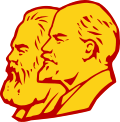| Part of a series on |
| Marxism–Leninism |
|---|
 |
The socialist state of the whole people as a term was introduced by the Communist Party of the Soviet Union (CPSU) as the all-people's state under Nikita Khrushchev's leadership to describe the class system of the Soviet Union. It denoted that the Soviet Union had moved away from the dictatorship of the proletariat to a new state of the whole people since the exploitative classes had been vanquished. The working class (known as the proletariat in Marxist discourse) was no longer to be the ruling class of the state alone, and all social groups were to be given equal representation in the state. [1] This term was redeveloped during Leonid Brezhnev's leadership of the CPSU as the state of the whole people, and added into the 1977 Soviet Constitution. [2] The state of the whole people is, according to Soviet ideologue Aleksei Rumyantsev, the class system of developed socialism. [3]